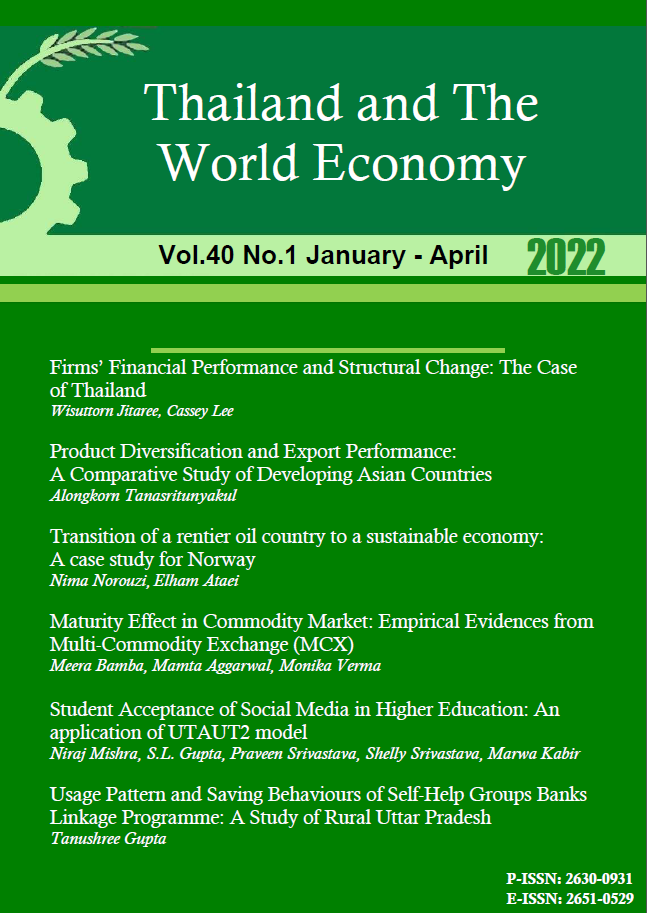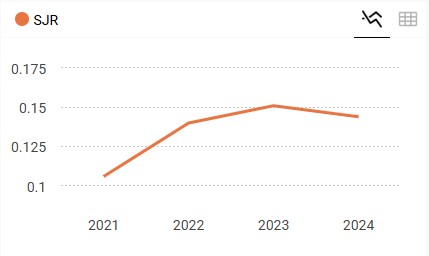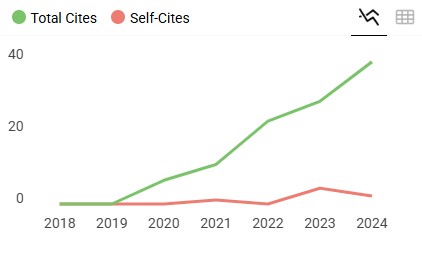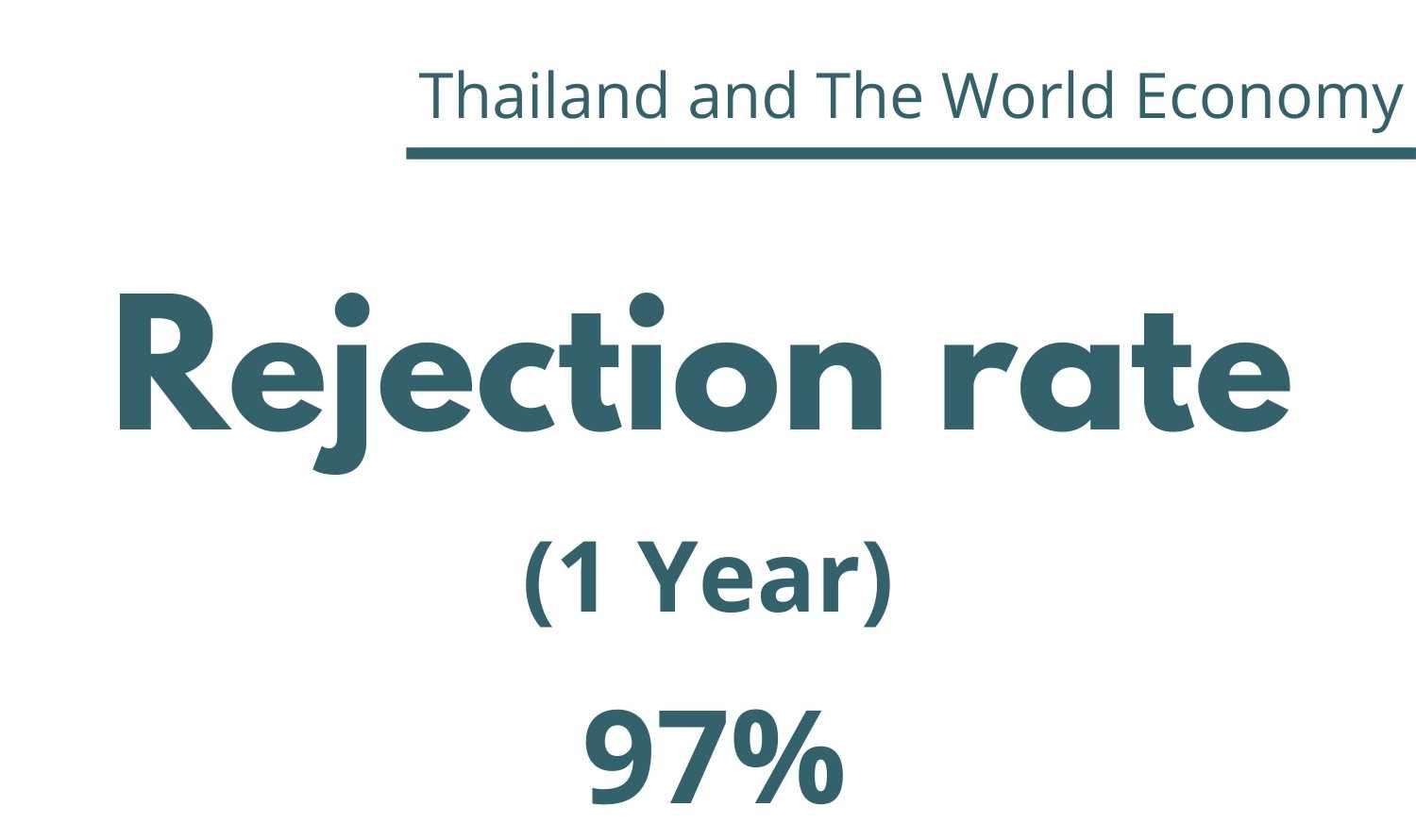Transition of a rentier oil country to a sustainable economy: A case study for Norway
Keywords:
Development, Rentier state, Petroleum, Management, Energy policyAbstract
Oil as the main source of economic and political power has played a significant role in oil governments’ political and social developments and has been one of the main pillars of power. But historical experiences have shown that having huge oil resources didn’t lead the countries to a certain development and welfare stage. The national dependence of oil-rich countries had various multidimensional consequences. One of the main reasons for this attitude is undoubtedly the reliance on oil revenues. Unlike other oil-rich countries, Norway focuses on human development instead of its natural assets, using oil wealth as support and engine of development. This support engine works by storing oil revenues in a Foreign Exchange Reserve Fund, investing it in different foreign industries within a clear framework, and preventing it from entering directly into the country’s budget plan. These frameworks Hence, in the case of Norway, not only oil does not have negative and anti-developmental consequences in political, social, and cultural aspects, but also the existence of oil as a natural gift that is used efficiently and with capable management like Norway’s sovereign fund, can fuel development and enhance countries’ economic capabilities and help develop various national industries. This developmental view has saved Norway from falling into the trap of rentierism. This paper aims to study the framework that helped Norway escape the trap of rentierism and become one of the few cases of developed oil-exporting countries.
References
Al-Sulayman, F. (2020). Reform dissonance’in the modern rentier state: How are
divergent economic agendas affecting state-business relations in Saudi Arabia. British Journal of Middle Eastern Studies, 47(1), 62-76.
Azari, M. (2010), The impact of oil revenues on the establishment of a rentier government and democracy. Quarterly Journal of Political Science, 4, 12-19.
Behzadi Forough, A., Norouzi, N., Fani, M. (2021). More Secure Iranian Energy System: A Markal Based Energy Security Model for Iranian Energy Demand-side. Iranian (Iranica) Journal of Energy & Environment, 12(2), 100-108.
Beblawi, H., & Luciani, G. (Eds.) (2015). The rentier state (Vol. 1). London : Routledge .
Backer, L. C. (2013). Sovereign investing and markets-based transnational rule of law building: The Norwegian sovereign wealth fund in global markets. American University International Law Review, 29 (1), 1-122.
Banerjee, A. V., & Duflo, E. (2005). Growth theory through the lens of development economics. Handbook of Economic Growth, 1, 473-552.
Beiser-McGrath, J., & Metternich, N. W. (2021). Ethnic coalitions and the logic of political survival in authoritarian regimes. Comparative Political Studies, 54(1), 144-178.
Boscheck, R. (2007). The governance of oil supply: An institutional perspective on NOC control and the questions it poses. International Journal of Energy Sector Management, 1(4), 366-389.
Bjørnland, H. C., Casarin, R., Lorusso, M., Ravazzolo, F. (2021). Oil and Fiscal Policy Regimes. CAMA Working Paper No. 10/2021, Retrieved from https://papers.ssrn.com/
sol3/papers.cfm?abstract_id=3769785
British Petroleum. (2020). Statistical Review of World Energy. Retrieved from https://www.bp.com/content/dam/bp/business-sites/en/global/corporate/pdfs/
energy-economics/statistical-review/bp-stats-review-2020-full-report.pdf
Berg, S. V. (2020). Opportunities for supply-side climate policies in a Norwegian context, Master’s thesis, University of Oslo, Oslo, Norway. Retrieved from https://www.duo.uio.no/handle/10852/80042
Bashirieh, H. (2003). Barriers to political development in Iran (Vol. 1). Tehran: Gam No Publishing.
Behdad, S. (2019). The political economy of Islamic planning in Iran. In Amirahmadi, H. & Parvin, M. (Eds.), Post-Revolutionary Iran (pp. 107-125). New York: Routledge.
Budsaratragoon, P., & Jitmaneeroj, B. (2021). Reform priorities for prosperity of nations: The legatum index. Journal of Policy Modeling, 43(3), 657-672.
Collier, P. (2010). The plundered planet: Why we must--and how we can--manage nature for global prosperity (Vol. 1). Oxford: Oxford University Press.
Cohen, N., & Naor, M. (2013). Reducing dependence on oil? How policy entrepreneurs utilize the national security agenda to recruit government support: The case of electric transportation in Israel. Energy Policy, 56, 582-590.
Christensen, T., Lægreid, P., & Røvik, K. A. (2020). Organization theory and the public sector: Instrument, culture and myth (Vol. 1). London: Routledge.
Cöster, M., Dahlin, G., & Isaksson, R. (2020). Are they reporting the right thing and are they doing it right?—A measurement maturity grid for evaluation of sustainability reports. Sustainability, 12(24), 10393.
Correlje, A., & Van der Linde, C. (2006). Energy supply security and geopolitics: A European perspective. Energy policy, 34(5), 532-543.
Caner, M., & Grennes, T. (2010). Sovereign wealth funds: The Norwegian experience. World Economy, 33(4), 597-614.
Derakhshanalavijeh, R., & Teixeira, J. M. C. (2017). Cost overrun in construction projects in developing countries, gas-oil industry of Iran as a case study. Journal of Civil Engineering and Management, 23(1), 125-136.
Delfrooz, M.T. (2002). Oil rents, financial crisis, democracy and civil society in the Middle East. Tehran: Salam Publications.
Døskeland, T. M., & Strömberg, P. (2018). Evaluating investments in unlisted equity for the Norwegian government pension fund global (GPFG). Retrieved from https://www.hhs.se/contentassets/662e98040ed14d6c93b1119e5a9796a4/doskelandstromberg2018.pdf
Dewenter, K. L., Han, X., & Malatesta, P. H. (2010). Firm values and sovereign wealth fund investments. Journal of Financial Economics, 98(2), 256-278.
Di John, J. (2011). Is there really a resource curse? A critical survey of theory and evidence. Global Governance, 17, 167-184.
Yale University. (2021). Environmental performance index 2020. Retrieved from https://epi.yale.edu/epi-results/2020/component/epi
Elsgård, T. (2014). Avoiding the resource curse: Lessons from Norway and Botswana to Ghana and Venezuela, Master’s thesis, University of Agder, Kristiansand, Norway. Retrieved from https://uia.brage.unit.no/uia-xmlui/handle/11250/219870
Fitzgerald, T. (2021). The New Map: Energy, Climate, and the Clash of Nations. The Energy Journal, 42(6), 279-283.
Freer, C. (2020). State religious authorities in rentier economies and the management of independent Islamism. British Journal of Middle Eastern Studies, 47(1), 42-61.
Green, F. (2018). The logic of fossil fuel bans. Nature Climate Change, 8(6), 449-451.
Government Pension Fund Global. (2021). Annual Report 2021, Retrieved from https://www.regjeringen.no/en/topics/the-economy/the-government-pension-fund/
government-pension-fund-global-gpfg/governance-framework-for-the-government-/
id696848/
Government Pension Fund Global. (2020). Annual Report 2020, Retrieved from https://www.nbim.no/contentassets/fd871d2a4e2d4c1ab9d3d66c98fa6ba1/annual-report_2020_government-pension-fund-global_web
Garavini, G. (2019). The rise and fall of OPEC in the twentieth century. Oxford: Oxford University Press.
Gylfason, T., & Zoega, G. (2006). Natural resources and economic growth: The role of investment. World Economy, 29(8), 1091-1115.
Hertog, S. (2020). The ‘rentier mentality’, 30 years on: Evidence from survey data. British Journal of Middle Eastern Studies, 47(1), 6-23.
Haj Yousefi, A.M. (1997). Relative independence of government or civil society in the Islamic Republic of Iran, Strategic Studies, 1, 7-19.
Haj Yousefi, A. M. (1997). The rentier government is a conceptual study. Political and Economic Information, 1, 125-126.
Hammond, J. L. (2011). The resource curse and oil revenues in Angola and Venezuela. Science & Society, 75(3), 348-378.
Hunter, T. (2014). Law and policy frameworks for local content in the development of petroleum resources: Norwegian and Australian perspectives on cross-sectoral linkages and economic diversification. Mineral Economics, 27(3), 115-126.
International Energy Agency. (2021). Norway statistics 2021. Retrieved from https://www.iea.org/countries/norway
Klimaomstillingsutvalget. (2021). Policies for a swifter transition and reduced risk. Retrieved from https://www.klimaomstillingsutvalget.no/summary-in-english/
Kakanov, E., Blöchliger, H., & Demmou, L. (2018). Resource curse in oil exporting countries. OECD Economics Department Working Papers 151 1.
Krane, J. (2020). Climate action versus inaction: Balancing the costs for Gulf energy exporters. British Journal of Middle Eastern Studies, 47(1), 117-135.
Karl, T. L. (1997). The paradox of plenty. Berkeley: University of California Press.
Karl, T. L. (2007). Oil-led development: Social, political, and economic consequences. Encyclopedia of Energy, 4(8), 661-672.
Kotera, G., Okada, K., & Samreth, S. (2012). Government size, democracy, and corruption: An empirical investigation. Economic Modelling, 29(6), 2340-2348.
Katouzian, H. (2005). The significance of economic history, and the fundamental features of the economic history of Iran. Iranian Studies, 38(1), 149-166.
Katouzian, H. (1995). Problems of political development in Iran: Democracy, dictatorship or arbitrary government. British Journal of Middle Eastern Studies, 22(2), 5-20.
Kamrava, M. (2002). The politics of weak control: State capacity and economic semi-formality in the Middle East. Comparative Studies of South Asia, Africa and the Middle East, 22(1), 43-52.
Lafferty, W. M., Knudsen, J., & Larsen, O. M. (2007). Pursuing sustainable development in Norway: The challenge of living up to Brundtland at home. European Environment, 17(3), 177-188.
Long, A., & Ascent, D. (2020). World economic outlook 2020-2021. Washington: International Monetary Fund. Retrieved from https://www.imf.org/en/Publications/WEO
Luciani, G. (2006). Constitutional reform and political participation in the Gulf. Lund: Lund University Press.
Lie, E. (2018). Learning by failing: The origins of the Norwegian oil fund. Scandinavian Journal of History, 43(2), 284-299.
Leslie, S. W., & Kargon, R. (2006). Exporting MIT: Science, technology, and nation-building in India and Iran. Osiris, 21(1), 110-130.
Mah, S. K. (2021). Earth, wind, and fire: PACE plays a vital ESG role. The Journal of Structured Finance, 26(4), 73-85.
Moshashai, D., Leber, A. M., & Savage, J. D. (2020). Saudi Arabia plans for its economic future: Vision 2030, the national transformation plan and Saudi fiscal reform. British Journal of Middle Eastern Studies, 47(3), 381-401.
Moritz, J. (2020). Re-conceptualizing civil society in rentier states. British Journal of Middle Eastern Studies, 47(1), 136-151.
Macias, J. J. (2016). Espoused and practiced stakeholder engagement in support of corporate social responsibility within the United States healthcare sector, Doctoral dissertation, Pepperdine University, Malibu, USA. Retrieved from https://search.proquest.com/openview/e9e2034f2d47b8b2cbb2d53f1b08f3be/1?pq-origsite=gscholar&cbl=18750.
Musavengane, R., & Kloppers, R. (2020). Social capital: An investment towards community resilience in the collaborative natural resources management of community-based tourism schemes. Tourism Management Perspectives, 34 (100654 ).
Murtinu, S., & Scalera, V. G. (2016). Sovereign wealth funds' internationalization strategies: The use of investment vehicles. Journal of International Management, 22(3), 249-264.
Morgunova, M. (2020). Why is exploitation of Arctic offshore oil and natural gas resources ongoing? A multi-level perspective on the cases of Norway and Russia. The Polar Journal, 10(1), 64-81.
Minnerop, P. (2019). Integrating the ‘duty of care’ under the European convention on human rights and the science and law of climate change: The decision of The Hague Court of Appeal in the Urgenda case. Journal of Energy & Natural Resources Law, 37(2), 149-179.
Norouzi, N., & Fani, M. (2021a). Environmental Sustainability and Coal: The Role of Financial Development and Globalization in South Africa. Iranian (Iranica) Journal of Energy & Environment, 12(1), 68-80.
Norouzi, N., & Fani, M. (2022a). Post-Covid-19 Energy Transition Strategies: Even Reaching 100% Renewable in Ecuador by 2055 is not Enough to Face Climate Change Issue. Iranian (Iranica) Journal of Energy & Environment, 13(1), 1-9.
Norouzi, N., Fani, M. (2021b). The seventh line: A scenario planning strategic framework for Iranian 7th energy progress plan by 2020-2025. Journal of Energy Management and Technology, 5(3), 43-53.
Norouzi, N., & Fani, M. (2020a). Black gold falls, black plague arise-An Opec crude oil price forecast using a gray prediction model. Upstream Oil and Gas Technology, 5 (100015 ).
Norouzi, N., Fani, M. (2020b). The impacts of the novel corona virus on the oil and electricity demand in Iran and China. Journal of Energy Management and Technology, 4(4), 36-48.
Nalule, V. R., & Mu, X. S. (2020). Should countries fire sell their oil & gas assets? Addressing the mis-conceptions surrounding the continued role of fossil fuels in the energy transition era. Journal of Sustainable Development Law and Policy, 11(2), 432-440.
Norouzi, N. (2021a). Post‐COVID‐19 and globalization of oil and natural gas trade: Challenges, opportunities, lessons, regulations, and strategies. International Journal of Energy Research, 45(10), 14338-14356.
Norouzi, N. (2021b). Oil shocks and the economic growth: A study for oil-importing and exporting countries in the time of Covid-19. Universal Journal of Business and Management, 1(1), 22–48.
Norouzi, N., de Rubens, G. Z., Choupanpiesheh, S., & Enevoldsen, P. (2020a). When pandemics impact economies and climate change: Exploring the impacts of COVID-19 on oil and electricity demand in China. Energy Research & Social Science, 68 (101654 ).
Norouzi, N., Fani, M., & Ziarani, Z. K. (2020b). The fall of oil age: A scenario planning approach over the last peak oil of human history by 2040. Journal of Petroleum Science and Engineering, 188 (106827).
Norouzi, N., & Fani, M. (2022b). Globalization and the oil market: An overview on considering petroleum as a trade commodity. Journal of Energy Management and Technology, 6(1), 54-62.
Norges Bank. (2020). Government pension fund global annual report 2019. Retrieved from https://www.nbim.no/en/the-fund/about-the-fund/
Nilsen, H. R., Sjåfjell, B., & Richardson, B. J. (2019). The Norwegian government pension fund global: Risk based versus ethical investments. Vierteljahrshefte zur Wirtschaftsforschung, 88(1), 65-78.
Nguyen, T. V., Tock, L., Breuhaus, P., Maréchal, F., & Elmegaard, B. (2016). CO2-mitigation options for the offshore oil and gas sector. Applied Energy, 161, 673-694.
Naifar, N., Shahzad, S. J. H., & Hammoudeh, S. (2020). Dynamic nonlinear impacts of oil price returns and financial uncertainties on credit risks of oil-exporting countries. Energy Economics, 88 (104747 ).
Osland, A. (2019). Norway’s sovereign wealth fund: Ethical dilemmas. Newbury Park: SAGE Publications.
Puertas, R., & Marti, L. (2021). Eco-innovation and determinants of GHG emissions in OECD countries. Journal of Cleaner Production, 319 (128739).
Pearson, M. M., Rithmire, M., & Tsai, K. S. (2020). Party-state capitalism in China. Boston: Harvard Business School Press.
Richter, T., & Steiner, C. (2008). Politics, economics and tourism development in Egypt: Insights into the sectoral transformations of a neo-patrimonial rentier state. Third World Quarterly, 29(5), 939-959.
Ross, M. L. (2001). Does oil hinder democracy?. World Politics, 53(3), 325-361.
Stevens, M. D. (2018). Ultradeep: A critical discourse analysis of Fort McMurray and the fires of climate change, Doctoral dissertation, University of Ottawa, Ottawa, Canada. Retrieved from https://ruor.uottawa.ca/handle/10393/37572
Szulecki, K., Fischer, S., Gullberg, A. T., & Sartor, O. (2016). Shaping the ‘Energy Union': between national positions and governance innovation in EU energy and climate policy. Climate Policy, 16(5), 548-567.
Spruyt, H. (1996). The sovereign state and its competitors: An analysis of systems change. Princeton, USA: Princeton University Press.
Scholtens, B., & Sievänen, R. (2013). Drivers of Socially Responsible Investing: A Case Study of Four Nordic Countries. Journal of Business Ethics, 115(3), 605-616.
Subkhonov, S. M. U. (2021). Rule Of law is becoming a value. The American Journal of Political Science Law and Criminology, 3(2), 115-122.
Truman, E. M. (2007). Sovereign wealth funds: The need for greater transparency and accountability (No. PB07-6). Washington, DC: Peterson Institute for International Economics.
Taşan-Kok, T. (2012). Introduction: Contradictions of Neoliberal Urban Plannin. In Tasan-Kok, T. & Baeten, G. (Eds.), Contradictions of Neoliberal Planning (pp. 1-19). Germany, Dordrecht: Springer.
Thompson, M. C. (2020). Inherent contradictions in the Saudi rentier state: Distributive capacity, youth employment preferences, and attitudes to education. British Journal of Middle Eastern Studies, 47(1), 77-95.
Tadeo, P. E. (2016). A comparative study of oil resource management in Norway and Nigeria: lessons for Kenya, Doctoral dissertation, University Of Nairobi, Nairobi, Kenya. Retrieved from http://erepository.uonbi.ac.ke/handle/11295/100422
Vivoda, V. (2014). Natural gas in Asia: Trade, markets and regional institutions. Energy Policy, 74, 80-90.
Young, K. E. (2020). Sovereign risk: Gulf sovereign wealth funds as engines of growth and political resource. British Journal of Middle Eastern Studies, 47(1), 96-116.
Yamada, M., & Hertog, S. (2020). Introduction: Revisiting rentierism—with a short note by Giacomo Luciani. British Journal of Middle Eastern Studies, 47(1), 1-5.
Yamada, M. (2020). Can a rentier state evolve to a production state? An ‘institutional upgrading’ approach. British Journal of Middle Eastern Studies, 47(1), 24-41.
Vasudeva, G., Nachum, L., & Say, G. D. (2018). A signaling theory of institutional activism: How Norway’s sovereign wealth fund investments affect firms’ foreign acquisitions. Academy of Management Journal, 61(4), 1583-1611.
Vera, L. (2015). Venezuela 1999–2014: Macro-policy, oil governance and economic performance. Comparative Economic Studies, 57(3), 539-568.
Wacziarg, R. (2012). The first law of petropolitics. Economica, 79(316), 641-657.
Zahorskyi, V. S., Lipentsev, A., Mazii, N., Bashtannyk, V., & Akimov, O. (2020). Strategic directions of state assistance to enterprises development in Ukraine: Managerial and financial aspects. Financial and credit activity: problems of theory and practice, 2(33), 452-462.
Downloads
Published
How to Cite
Issue
Section
License

This work is licensed under a Creative Commons Attribution-NonCommercial-NoDerivatives 4.0 International License.










